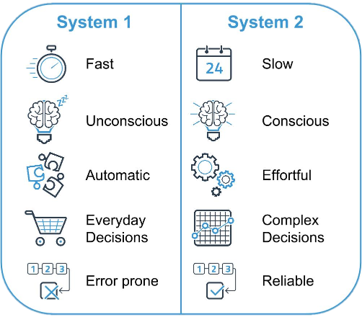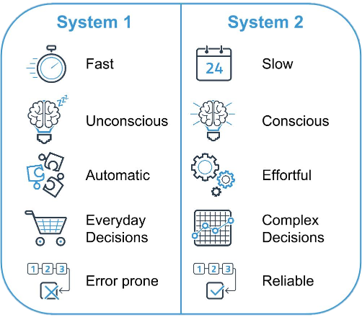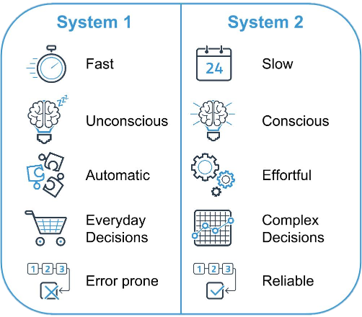11. Decisions, Judgements + Reasoning
1/44
There's no tags or description
Looks like no tags are added yet.
Name | Mastery | Learn | Test | Matching | Spaced | Call with Kai |
|---|
No analytics yet
Send a link to your students to track their progress
45 Terms
General themes
________________ - From the standpoint of formal logic and probability, humans do not always reason well
General world knowledge and pre-existing knowledge often has too much influence on human reasoning
Prior knowledge and beliefs influence our reasoning abilities
Confirmation Bias
People usually (but not always) reason better with concrete vs. abstract material
Ex: Echo chambers in manosphere politics
Confirmation bias
General themes
______________ - we tend to seek out confirmatory evidence to support our beliefs, and we do not seek out or ignore evidence that contradicts our beliefs
A focus on errors
___________ - In this topic we focus on errors = not that we cannot process info or are “dumb”
Errors are the cost of quick, efficient mental processing
Dual Process View
When have you seriously gone and wondered if you were wrong about something?
Dual process model of thinking
A focus on errors
_____________ - System 1 uses intuitive thinking (Fast; heuristics) & System 2 usees analytical thinking (Slow; Analytic)
Tversky & Kahneman
People with lower domains of knowledge have a tendency to find themselves MORE correct than those with actually higher domains of knowledge

System 1 thinking → intuitive
Dual process model of thinking
______________ - Quick and reflexive
Little mental effort required
Relies on heuristics, → don’t have to even think about it
Stereotypes on race, saying “bread”– then “butter”

System 2 thinking → analytical
Dual process model of thinking
_______________ - Slow and reflective; deliberate
Requires mental effort
Effortful- uses conscious resources
Ex: Figuring out what uni major you’re doing

Cognitive misers
Dual process models of thinking
_______________ - allows us to simplify our world and attend primarily to what is meaningful and manageable.
Heuristics often work very well, or good enough
There can also be problems with heuristic thinking
Stereotypes based on superficial differences like race can be problematic
Humans are….. ____________
We are frugal + stingy with our limited mental energy
System 2 uses mental energy
“Fast and frugal”
________________ - System 1 is..
We need to process huge amounts of information all of the time
Arguments
Reasoning
_______________ - split into two parts:
Premises: Basic principles or assertions
Conclusion: A statement that is established or supported by the premises.
Example:
All Dogs are Mammals (Premise)
Teddy is a Dog (Premise)
Therefore, Teddy is a mammal (Conclusion)
Premises
Reasoning → parts of arguments
____________ - Basic principles or assertions
Example:
All Dogs are Mammals
Teddy is a Dog
Conclusion
Reasoning → parts of arguments
____________ - A statement that is established or supported by the premises
Example:
Therefore, Teddy is a mammal
Deductive reasoning
________________ - An argument that, if valid (proper logical form) must be true if the premises are true
If the premises are true, the conclusion must be true if the argument uses a valid logical form
Logically valid arguments do not have to have true premises
Meaning of valid
Deduction example
Deductive and inductive reasoning
_____________ - 60% of the people called said they are Democrats
Therefore, 60% of the people called are Democrats
Induction example
Deductive and inductive reasoning
_____________ - 60% of the people called said they are Democrats
Therefore, approximately 60% of voters in the country are Democrats
Inductive reasoning
______________ - An argument that, if strong, provides good evidence to support the truth of a conclusion
If the premises are true, the conclusion is likely to be true
Valid
Deductive and inductive reasoning → deductive reasoning
____________ - Must guarantee the truth of the conclusion

Syllogisms
_______________ - A three-statement logical form, with the first two parts stating the premises and the third part stating a conclusion based on those premises
Deductive reasoning using categories— drawing conclusions based on group membership
Based on statements about categories or groups (like "all," "some," "none").
Syllogistic reasoning vs. conditional reasoning
Conditional reasoning
_____________ - (aka “if-then” reasoning). Drawing conclusions based on if conditions were met or not.
Based on cause-effect or if-then logic.
Classic format:
If A happens, then B will happen.
A happened.
Therefore, B will happen.
Syllogistic reasoning example
Syllogisms and conditionals
______________ - Are conditions being met, or are conclusions drawn based on group membership?
All A are B
All B are C
Therefore, all A are C
Example:
All humans are mortal.
Socrates is a human.
Therefore, Socrates is mortal.
Conditional reasoning example
Syllogisms and conditionals
______________ - Are conditions being met, or are conclusions drawn based on group membership?
If P, then Q (______ Statement)
P (Evidence)
Therefore, Q (Conclusion)
Example:
If it rains, the ground gets wet.
It rained.
So, the ground is wet.
Affirm consequence → valid/logical
Conditional reasoning — valid or not?
If I am a freshman, I have to register today
I am a freshman
Therefore, I have to register today

Deny consequence → not valid/illogical
Conditional reasoning — valid or not?
If I am a freshman, I have to register today
I am not a freshman
Therefore, I do not have to register today

Affirm consequence → not valid/illogical
Conditional reasoning — valid or not?
If I am a freshman, I have to register today
I have to register today
Therefore, I am a freshman

Deny consequence → valid/logical
Conditional reasoning — valid or not?
If I am a freshman, I have to register today
I do not have to register today
Therefore, I am not a freshman

Errors in conditional reasoning
Conditional reasoning
______________ - People are good at affirming the antecedent
People often make errors with these types of conditional reasoning
Mistake conditional statement “IF P, THEN Q” for biconditional statement (I.e., “IF P, THEN Q” = “IF Q, THEN P”)
Research indicates people make these errors even when comprehending discourse (e.g., Sloutsky, 2002)
Wason Selection Task
_____________ - If a card has a vowel on one side, then it must have an even number on the other side
Human reasoning task – participant job is needed to verify OR disconfirm this rule
Most people turn around E and 4 but they are both incorrect, and instead signs of confirmation bias. The correct combo was 7 (odd no.) and E (vowel) to see the disconfirming evidence

Confirmation bias in the Wason Selection Task
Wason Selection Task
______________ - Choosing E and 4 is an example of the confirmation bias:
We seek out confirming evidence, or information that is consistent with a hypothesis, rather than inconsistent information
____________ is pervasive in human reasoning
Myside Bias

Myside bias
Wason Selection Task → Confirmation bias
______________ - the tendency to be over-swayed by a prior opinion on a topic, failing to give enough weight to evidence or arguments to the contrary
Availability heuristic
Heuristics
_________________ - Estimates are influenced by the ease with which relevant examples can be remembered
A simple shortcut where we make estimates based on what we can think of
Biases within the availability heuristic
General World Knowledge
Familiarity Bias
Salience and Vividness Biases
Examples of availability heuristic
Availability heuristic
____________- What proportion of households in Canada have an iPad?
How likely are you to be harmed by a terrorist attack?
General world knowledge
Availability heuristic
_______________ - Our existing knowledge factors into our estimates
Example: Estimate the ratio of the number of Chevrolets sold to the number of Cadillacs sold
People may incorporate what they know about these vehicles into their estimate: the cost and how many people are likely to be able to afford a Cadillac
Familiarity bias
Availability heuristic
_______________ - Judging events as more frequent or important because they are more familiar
Example: Tversky & Kahneman
Food additives
Political candidates
People think famous/familiar names are more common even if that is not the case
People play on familiarity on ads to continue bringing it up, like how PP is bringing up identity politics to Canada when it has never been like that before
Salience + vividness biases
Availability heuristic
_______________ - A particularly notable or vivid memory influences judgments about the frequency or likelihood of such events
Is it safer to travel by car or airplane?
25 times safer to travel by airplane
Example of familiarity bias
Availability heuristic → familiarity bias
_____________ - Tversky & Kahnema
Gave people lists with 39 names (19 women’s names and 20 men’s names per list)
Some Ps had to recall names, some had to estimate if there were more men’s than women’s names
In some lists the men’s names were famous (but not the women’s), in others the women’s names were famous (but not the men’s)
Results: People could recall more famous names (12/19) than non-famous names (8/20)
Results: People estimated that there were more names in the men’s or women’s list if the names were famous
Familiarity affects our judgment beyond estimates of frequency
Simulation heuristic
Heuristics
______________ - A mental construction or imagining of outcomes; a forecasting of how some event will turn out or how it might have turned out under different circumstances
Also includes possible events
Guided by the ease with which the possible outcomes come to mind or can be imagined (heuristic)
Difficulties imagining
Simulation heuristic
____________ - When imagining a scenario, alternatives that are difficult to imagine or seem less plausible are judged as unlikely to occur
If an alternative is difficult to imagine no mental scenario will be formed, therefore it will not be judged as likely or unlikely to occur at all
If you cannot imagine possibility A, you cannot consider possibility A
If we can mentally construct a picture or imagine it– it can be thought to be more likely. If you cannot imagine a possibility, you cannot consider that possibility
Example of simulation heuristic
Simulation heuristic
_______________ - Kahneman & Tversky (1982)
Mr. Crane and Mr. Tees were scheduled to leave the airport on different flights, at the same time.
They traveled from town in the same limousine, were caught in a traffic jam, and arrived at the airport 30 minutes after the scheduled departure time of their flights.
Mr. Crane is told that his flight left on time. Mr. Tees is told that his flight was delayed, and just left five minutes ago.
Who is more upset, Mr. Crane or Mr. Tees?
Mr. Crane: Missed his flight by 30 minutes (it left on time).
Mr. Tees: Missed his flight by just 5 minutes (it was delayed)
People assume Mr. Tees is more upset because they can imagine themselves in his shoes more easily
Representativeness heuristic
Heuristics
______________ - An estimate of the probability of an event is determined by one of two features:
How similar the event is to the population of events it came from
And/or whether the event seems similar to the process that produced it
Random Processes
Random processes
Representativeness heuristic
____________ - If a coin is tossed 6 times, which is more likely to occur?:
H H H T T T or H H T H T T
Representativeness of the parent population
Representativeness heuristic
_______________ - Kahneman & Tversky (1972)
There are two hospitals in a town. In one, about 45 babies are born each day. In the other, only about 15.
About 50% of all babies are boys, although on any day this percentage may be higher or lower
Across one year, the hospitals recorded the number of days on which 60% or more of the babies were male.
Which hospital do you think had more such days?
Results:
28/50 Ps said the hospitals would be the same
12/50 Ps said it was the larger hospital
10/12 Ps said it was the smaller hospital
Correct Answer:
The smaller hospital.
Because smaller samples have more variability—so they’re more likely to swing to extremes like “60% boys.”
Ignoring base rates
_______________ - Kahneman & Tversky (1973)
Read various personality descriptions to people
Ps were asked to estimate the probability that the described person was a member of one or another profession:
Psychologists interviewed and tested the personalities of 30 engineers and 70 lawyers’
What is the probability that the person is an engineer?
Jack is a 45-year-old man. He is married and has four children. He is generally conservative, careful, and ambitious. He shows no interest in political and social issues and spends most of his free time on his many hobbies, which include home carpentry, sailing, and mathematical puzzles
A person named Bill was randomly selected from the roomful of 100 people.
Thinking of heuristics adaptively
_______________ - Gigerenzer (1996) Heuristics are adaptive, used to save mental resources and they work!
They are fast and frugal:
Satisficing
Recognition heuristic
“Take the best” heuristic
Other viewpoint on heuristics on how they aren’t always problematic, but can be adaptive. (two sides of the coin, sometimes they can be helpful as well)
Satisficing
Thinking of heuristics adaptively → fast and frugal heuristics
______________ - decide by taking the first solution that satisfies some criterion we may have
the “good enough” heuristic
Ex: You’re really hungry, but have somewhere to be in an hour– are you going to risk weighing each restaurant to sate your hunger? No, you’ll get something quick to eat here
Recognition heuristic
Thinking of heuristics adaptively → fast and frugal heuristics
______________ - base a decision on whether we recognize the thing to be judged
“Take the best” heuristic
Thinking of heuristics adaptively → fast and frugal heuristics
______________ - decide between alternatives based on the first useful information we find